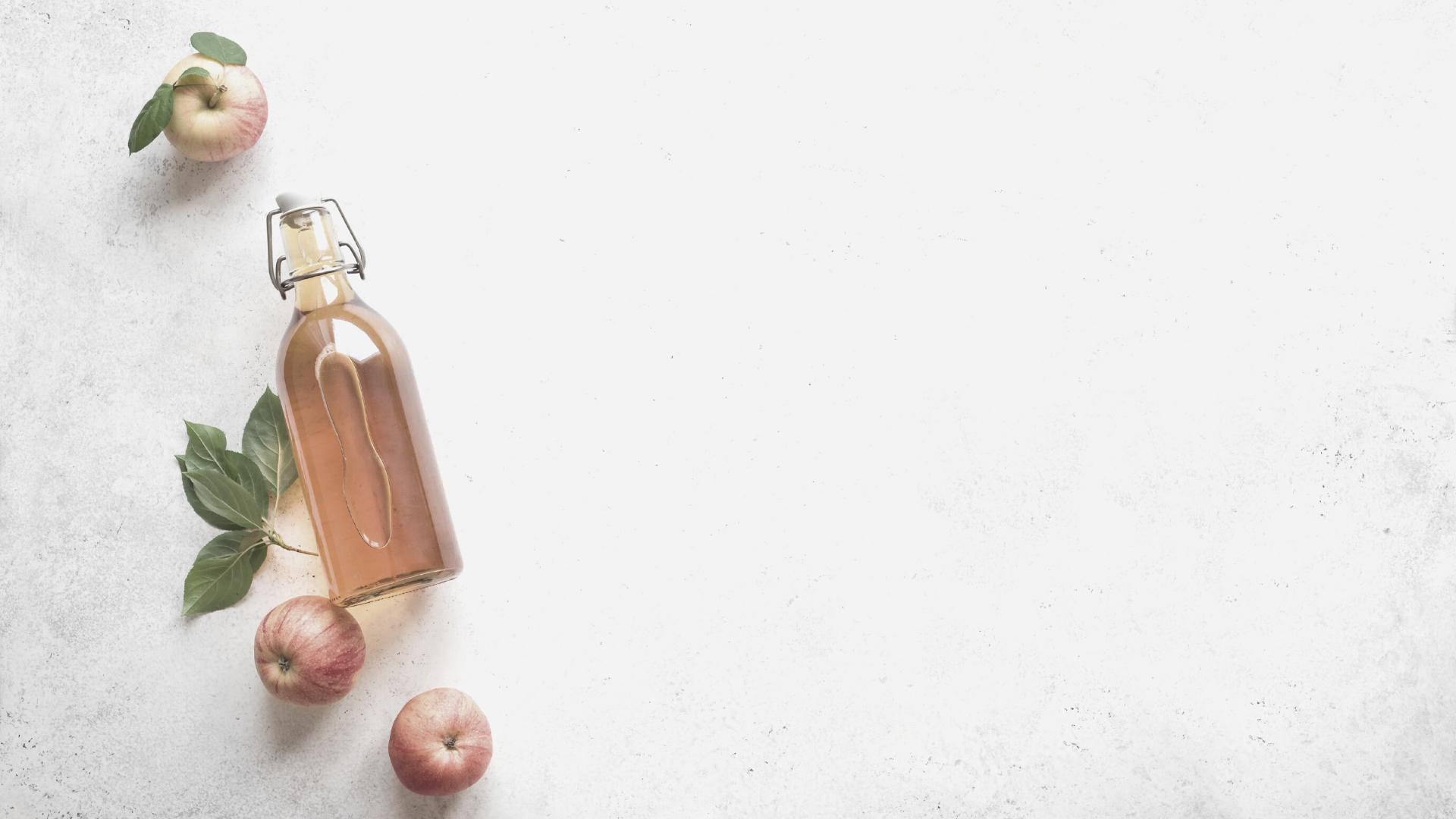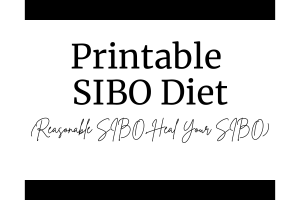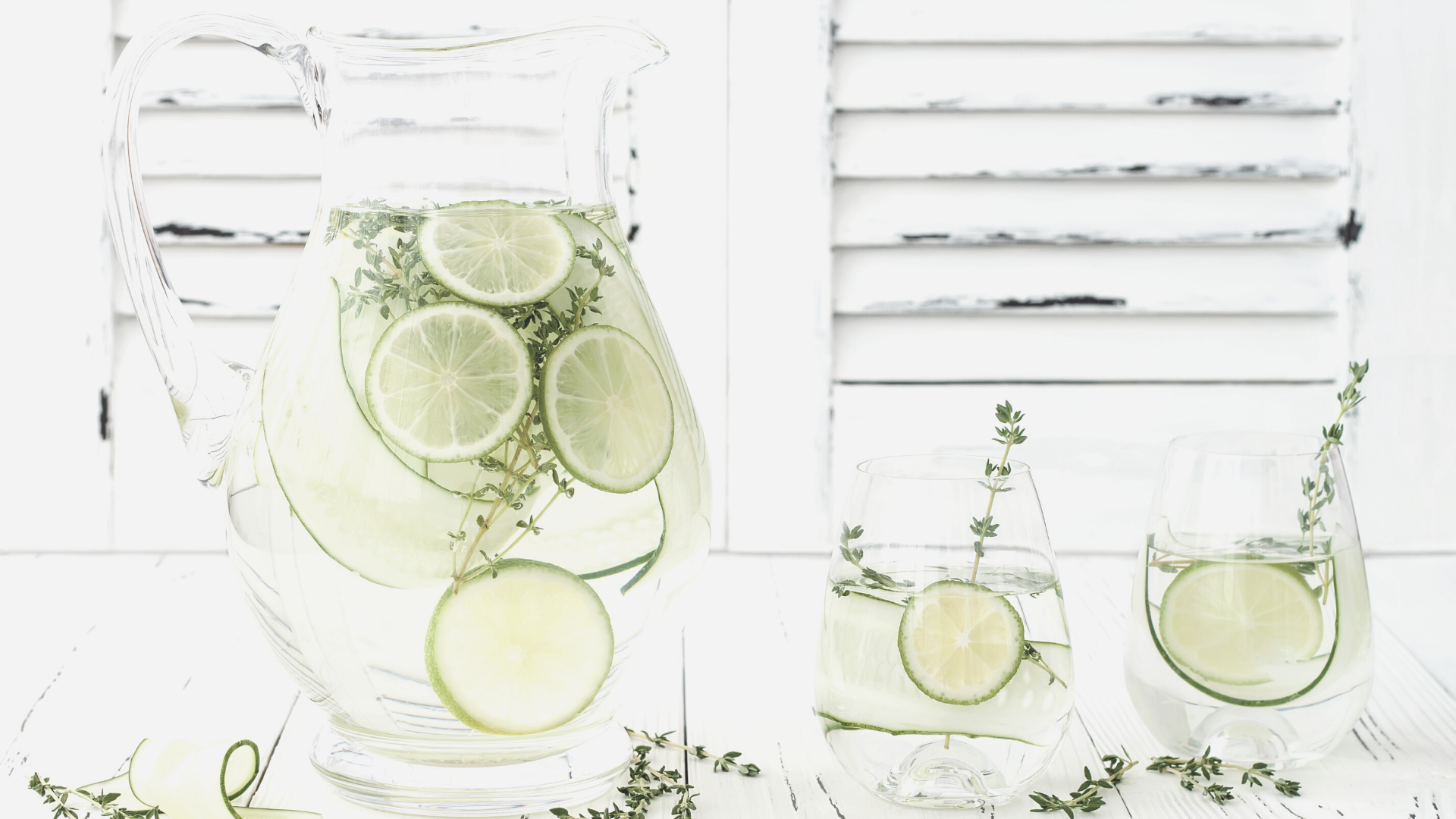Let’s explore what the best plant based multivitamin for your gut health is while also answering the question, “Can a multivitamin help with gut health?”
The short answer to this question is ‘Yes, yes a multivitamin can help with gut health.’
And the longer answer can be found within this post.
What is a Multivitamin?
A multivitamin is simply a supplement that contains any combination of essential vitamins, minerals, and oftentimes other ingredients as well.
It’s the sum of the part of various supplements you might take individually.
For example, you could take any of the Vitamin B supplements (B12, B6, B2, etc), Vitamin C, Vitamins A or K, and/or a Vitamin D supplement or you could ensure that all of those vitamins are included in one multivitamin.
The difference between the individual and multivitamin is quantity of each ingredient and the fact that a complete multivitamin contains many things vs. one main ingredient.
People typically take a multivitamin to ensure they are getting enough vitamins in their diet, namely because the food supply has become so depleted of nutrients.
Nutrients for Gut Health and Gut Healing
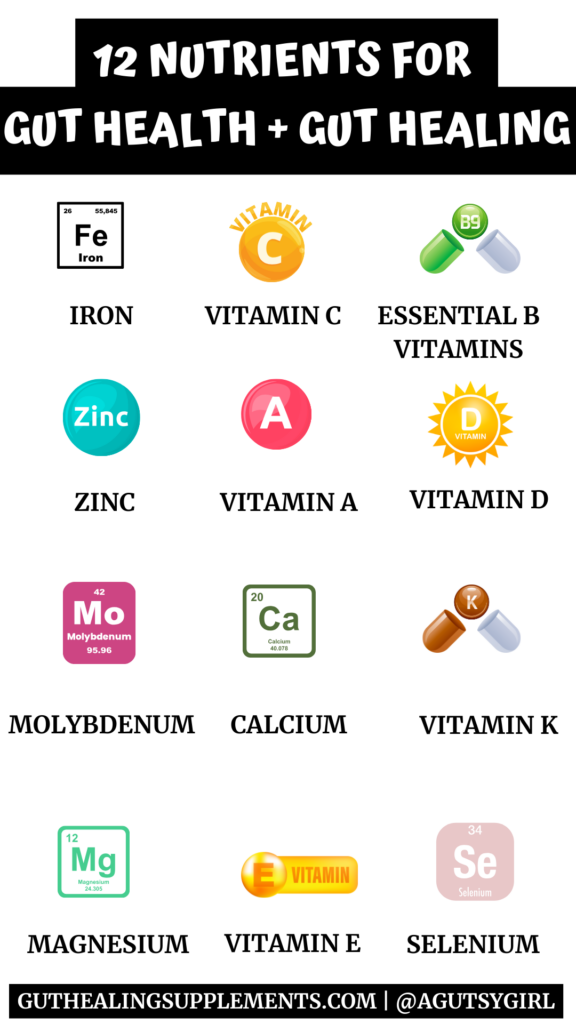
Of course you know by now that proper nutrition is key for overall gut health and (especially) when trying to heal your gut.
Different supplements can play different roles along the way, and it is important to know what those look like for you.
Gut Health
When I talk about nutrients for gut health and gut healing, it’s probably the most important discussion in answering the question, “Can a multivitamin help with gut health?”
This is because a supplement, any supplement, on its own is useless unless you know why you are taking it and can be sure that taking it can and will be beneficial.
Here is what the research says about nutrients for overall gut health.
- Vitamin C. This is critical for the overall immune system, but it’s relevant for digestion as it helps absorb iron. Vitamin C also keeps the digestive system moving, and helps prevent constipation. (Learn all about Vitamin C for Gut Healing HERE.)
- Essential B Vitamins. They are critical for the digestive system, and include vitamins B: B1, B3, B6, Biotin, and B12. (Learn more about Vitamin B12 HERE.)
- Magnesium. Magnesium helps minimize overall gut inflammation. It’s also incredible for constipation. (Learn more about Magnesium HERE.)
- Vitamin D. It helps your body absorb calcium and plays a key role in how your nerves, muscles, and immune system function. High levels of Vitamin D are also associated with reduced risk for colon cancer. (Learn more about Vitamin D HERE.)
- Iron. Iron helps support the good bacteria in the gut. This is a trace mineral that we need in a smaller quantities, but it is just as important.
- Selenium. Also a trace mineral, but a lack of selenium has been proven to increase stress and inflammation, leading to potential damage to the lining of the gut which causes leaky gut. Selenium deficiency is also linked to a higher risk of bowel disease. (If you want to learn more about trace minerals, check out THIS podcast episode on micronutrients and the gut.)
- Zinc. Even a mild zinc deficiency can reduce digestive enzyme production, which increases the likelihood of leaky gut. (Read: Why Zinc is Important for Gut Health HERE.)
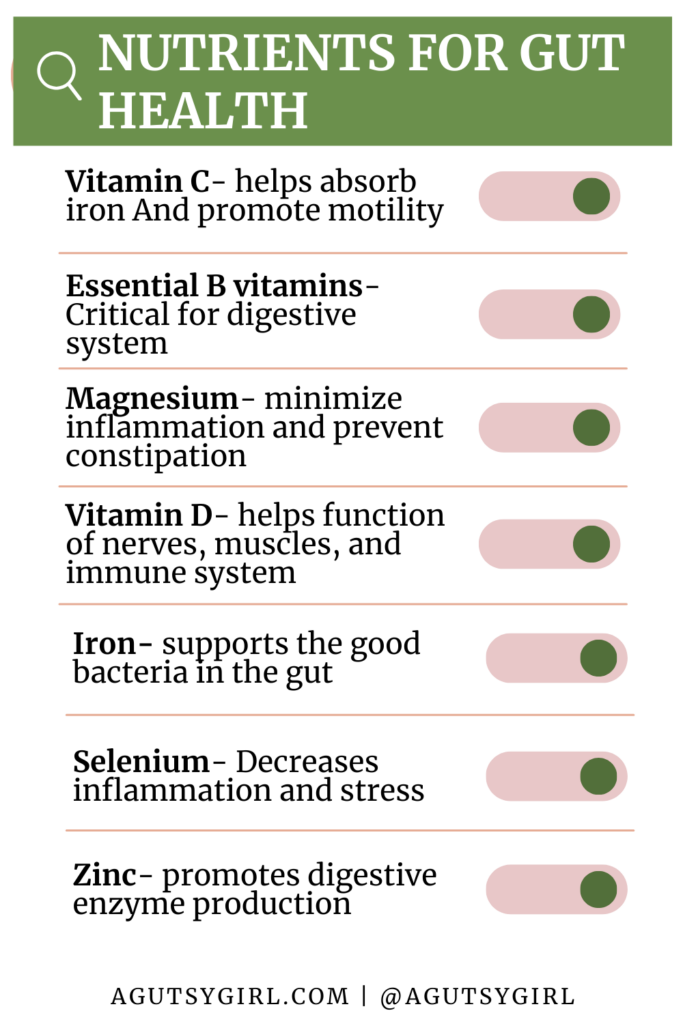
Gut Healing
Now, you see the above and then question, “But what about a vitamin like A? Didn’t you write a post called, Vitamin A and SIBO?”
Yes, you’re so smart!
Now this is where, again, it goes back to gut health vs. gut healing.
Here are some nutrients that might not directly relate to the digestive system.
However, depending on your circumstances and illness(es), could absolutely be related.
- Vitamin A. This vitamin has implications for the gut and skin; when you have a condition like SIBO, you’re likely to become deficient in it. (Learn more about Vitamin A HERE.)
- Vitamin E. Vitamin E is essential for protecting the cells of the skin from free radical damage due to sun exposure and other inflammatory insults. Deficiency is extremely common, particularly in those with inflammatory gut conditions and fat malabsorption, and can alter collagen cross-linking and cause skin ulcerations.
- Molybdenum. Molybdenum is a relatively unknown trace mineral that is critical to your overall health. When fighting yeast overgrowth or managing allergies, getting enough molybdenum is particularly important. (My goal is to write much more on this trace mineral.)
- Omega-3 fatty acids. If we already know that omega-3 fatty acids help reduce inflammation, then it’s obvious as to why omega 3’s play an important role in overall gut healing.
Make note that any and all of the above from the gut health list could be added here as well.
Sources: HERE, HERE, HERE, and HERE.
Can a Multivitamin Help with Gut Health
Click HERE to save this information for later.
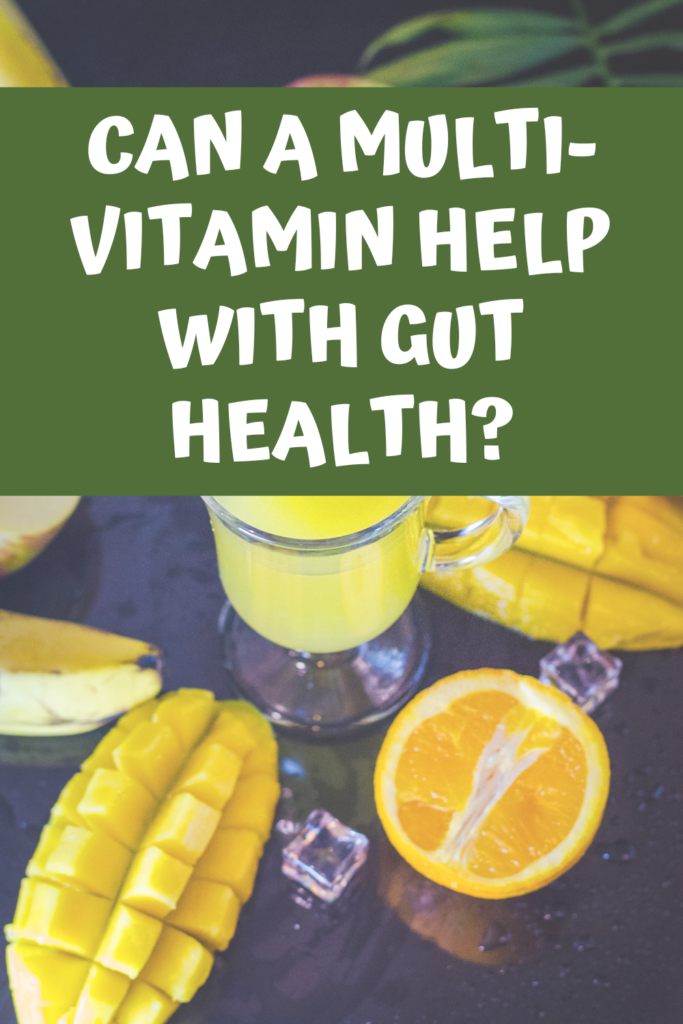
Okay, so now it’s time to answer the question of the day,
Can a multivitamin help with gut health?
Based on the research and thoughts from above, the answer is still a resounding ‘yes.’
The considerations are as follows:
- Immune system boost. I don’t think there is a soul on the planet who doesn’t want an immune system boost. Even at your healthiest, illness always looms. The common cold, flu, and other bacteria and virus’ are always looming. Everyone benefits from an immune system boost. And if your immune system is already compromised for any reason, a boost becomes even more critical.
- Choose the right / good multivitamin. Are you supplementing with a multivitamin more-so from a gut health or gut healing standpoint? Understanding that from the get-go could help you determine which multivitamin will be best for you. I have written more about these things to consider below.
- What else? Be sure you understand what else the multivitamin contains. Many multivitamins contain ingredients that will not behoove your overall gut health and/or gut healing journey. If you spot an ingredient on the label that you do not recognize, look it up. Because listen, especially with the so-called “healthy plant-based diet” there can be a lot of junk vegan ingredients. In case you want more information on this, tune into What is Vegan Meat {and what are the substitutes made of?}
What is a plant-based multivitamin?
Contrary to popular belief, a plant-based multivitamin does NOT (necessarily) mean that it must be vegan.
This, my friend, is the definition of a plant-based diet,
A plant-based diet is not a vegetarian or vegan diet; you can eat poultry, beef, eggs, fish, and dairy products, however most of your nutrient intake is coming from plant-based food sources. There is no set ratio of plant to animal foods on a plant-based diet, but at least 2/3 of each plate of food (or meal) you eat is a good way to start. The emphasis should be on plants.
source
And, in fact, I would argue that THIS (what is described above) is the best way to go about a lifelong, optimal gut healthy diet.
But that’s neither here nor there today.
What’s important is that we take a closer look at what a superior plant-based multivitamin might consist of:
- meets nutritional needs (this varies by person)
- contains essential nutrients
- minimal animal sources; mostly plant-based sources
- natural ingredients
- comes in a glass bottle
- contain components found in whole foods
Best Plant Based Multivitamin [7 to consider for your gut health]
Click HERE to save this post for later.
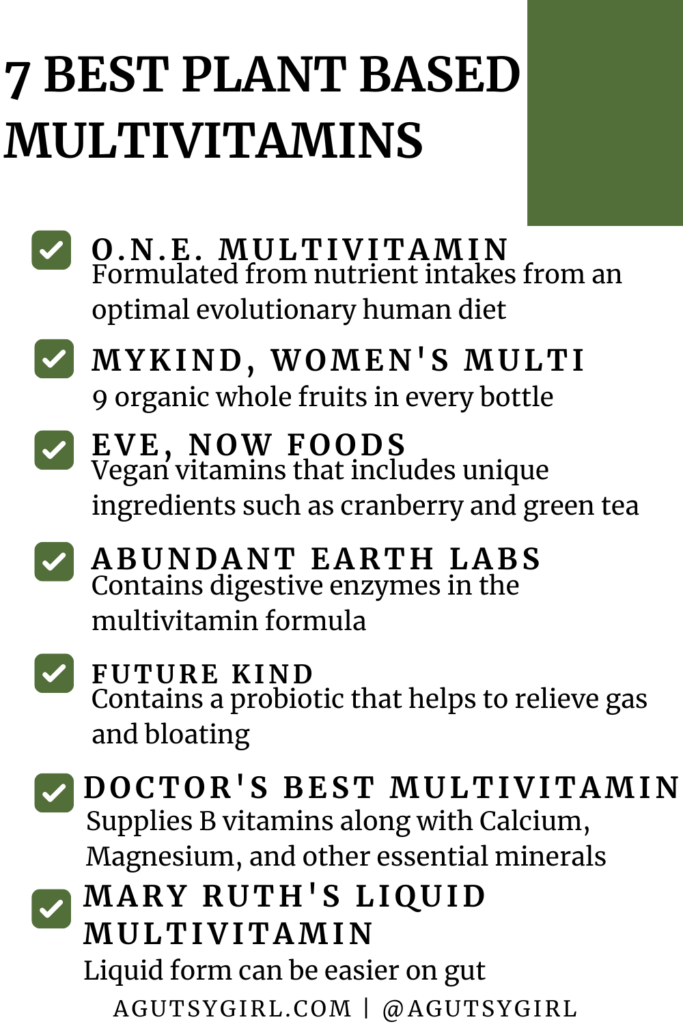
So, if we take the above into consideration, here are 7 best plant based multivitamins to consider for your overall gut health journey.
1. O.N.E Multivitamin
This once-daily multivitamin with sustained-release CoQ10 comes from Pure Encapsulations.
It provides vitamins A, B, C, D and E in highly bioavailable forms, and is made with high-quality vegetarian ingredients backed by verifiable science.
2. MyKind, Women’s Multi
Why I chose this one? MyKind comes from Garden of Life and Alicia Silverstone, both of which I’ve written about before.
These particular vitamins are gummy vitamins, which work better for some with digestive issues than swallowing pills.
The gummies boast 9 organic whole fruits in every bottle, real food for plant-based eaters.
3. Eve, from NOW Foods
Eve is the women’s multivitamin from NOW Foods.
I chose to include them because I have toured their facilities and have met the CEO. I trust them, and that’s important to me.
These vegan vitamins contain some unique ingredients: Evening Primrose, Cranberry, Green Tea, Horsetail Silica & CoQ10.
If you’ve been looking for a multivitamin that includes them, Eve might be your best option.
4. Abundant Earth Labs
What I like about this one for my Gutsy friends is that, in addition to being one of the best vegan multivitamins, it also includes digestive enzymes right in the formula.
Digestive enzymes are key for most of us. The only problem some might have with this one is that, like the Future Kind multivitamin, there is also a probiotic in it.
While marketing will tell you that’s always a good idea, I’m promising you that it is not. This is because all probiotics are not created equally and furthermore there is a huge download you need to have surrounding probiotic strains vs. species.
5. Future Kind
Why I chose this one?
IF you are looking for a multivitamin that has a probiotic in it, this might be for you.
Future Kind contains probiotics: Our vegan supplement helps relieve gas and bloating with 30 million CFUs of Lactobacillus acidophilus and a digestive enzyme complex from plants. This special probiotic enzyme blend gives additional flora health support to give you the daily digestive advantage.
6. Doctor’s Best Multi-Vitamin
I namely chose this one because I like the Doctor’s Best Vitamin C.
Doctor’s Best Multi-Vitamin and multiple mineral formula supplies B vitamins in their best-utilized forms, B vitamins including B6, B12 and Biotin, along with Calcium, Magnesium and other essential minerals.
7. Mary Ruth’s Liquid Multivitamin
This one was chosen almost solely for the fact that it comes in liquid form and sometimes the Gutsy health problems require liquid vs capsule or even powder.
It also contains a special amino acid ingredient.
Animal Products
Since I’ve done a lot of studying on gut health and gut healing plus also healed myself from over a decade of misery, I would be remiss if I didn’t quickly address animal products and vegan supplements.
For one reason or another, if you must be 100% vegan, then please keep in mind the following when it comes to a 100% vegan multivitamin:
- The multivitamin is not intended to replace a balanced vegan diet (or any diet for that matter).
- A vegan multivitamin will not contain omega-3 DHA and/or EPA omega-3s. For many reasons, namely inflammation reduction, consuming these do contribute to better health. IF you are okay with them, either find a multivitamin that contains them (not many will be an all-in-one, though) or get yourself a high-quality fish oil supplement.
- Investigate that multivitamin hard. Was it tested in a performance lab? Does it serve all your personal, unique and different needs?
After you’ve been taking your multivitamin for any length of time (or any supplement for that matter), ask yourself:
- How is this working for me?
- How are my energy levels?
- What did my blood test show?
- Am I still seeing nutrient deficiencies? What are they?
Remember, without trying, tracking, and analyzing, you’ll never know what’s working for you on your journey.
It’s why I created gut healing journals for the Gutsy community. Because you deserve to know what works, what doesn’t – what makes sense to spend your hard-earned money on and what is just a waste of resources.
If you liked this post, you might also enjoy:
- Chia Seeds Pudding {Vegan, Keto, and Paleo Friendly}
- A Gutsy Girl’s nutritional supplements line
- Best Organic Low-FODMAP Vegan Protein Powder
Xox,
SKH
🤰 bloating be gone! weight loss through optimal gut health for women
💃ʜᴇᴀʟ ʏᴏᴜʀ ɢᴜᴛ. ʜᴇᴀʟ ʏᴏᴜʀ ʟɪfe.
🫶🏻 founder gutbyome.com

